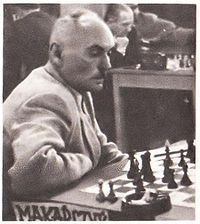login:
Tak, chodźmy DarthStapler!
Polish chess in a nutshell
https://chess24.com/en/read/news/fr...
by Marcin Furdyna
to
When Poland Was a Chess Superpower
https://culture.pl/en/article/when-...
by Marek Kępa
Excerpt
'.. Poland’s fourth player on the 1930 gold-winning team in Hamburg was Kazimierz Makarczyk, winning 7.5 points from his 13 games. Makarczyk was born on 1st January 1901 in Warsaw and attended the Michał Kreczmar Middle School alongside such noted Poles as the poet Antoni Słonimski and writer Leopold Tyrmand. In 1915, he and his family relocated to St. Petersburg but they returned to Warsaw in 1918. In the Russian city, the young Makarczyk learned how to play chess, a game which he grew to hold very dear.
Back in Warsaw, he began to study law but financial difficulties caused him to put his education on hold in 1922. Makarczyk found employment at a bank and began to edit chess sections in the press (he returned to studying in 1929, but in the field of philosophy). In 1926, he became assistant editor at Świat Szachowy and later also worked at the Ministry of Public Works.
Until the mid-1920s, his participation in chess tournaments didn’t bring much success, but in 1927 he won the bronze medal at the Polish chess championship in Łódź. That same year, he won second prize ex-aequo at the championship in Warsaw. This streak granted him a place on the Polish team for the 1928 chess Olympiad in the Hague where Poland won bronze. Makarczyk’s talents were appreciated and he ended up representing Poland at five chess Olympiads during the Interwar period, winning one gold, one silver and two bronze medals.
Makarczyk valued precision, he had a solid, positional style of play. His favourite saying was: ‘Concentrate the most, when you gain a winning position.’
From ‘Arcymistrzowie’ by Stefan Gawlikowski, trans. MK
During World War II, Makarczyk was involved with the Polish resistance and took part in the Warsaw Uprising. As a result he was imprisoned at a German camp near Dresden which was liberated in 1945. He returned to Poland, settling down in Łódź where he became an adjunct at the Logic Department of the local university. In 1948, he became Poland’s new chess champion at a tournament organised in Kraków and the following year he won the title in Łódź. In the 1950s, he began to withdraw from public chess life. He died on 27th May 1972 in Łódź. ..'
Stara miłość nie rdzewieje.







